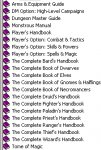El Mahdi
Muad'Dib of the Anauroch
The major problem with this thread is that it's talking about the feasibility of supporting all editions in the DDI...
...SO, why on earth do we think that this work on old stuff will net them more than work on new stuff?...
I don't know about anyone else, but I wouldn't expect WotC to divert resources away from current DDI projects. In fact what I would want out of DDI for older edition stuff, hinges upon getting the current tools working properly for 4E first (working and fully integrated character/monster/encounter builder-compendium-virtual table, and ability to apply optional house-rules presented in Dragon and most common fan created variations - also a "manual" mode for entering values on the character sheet outside of the auto-calculations). But, once these tools are done (except for maintenance and updates), then yeah, move on to doing the same thing for the old stuff, working on them in order of number of players (based on polling).
Most likely, that would mean starting with 3E. Start by adapting the same tools used for 4E, for use with the SRD material (non-OGL material not required - at first). (Preferrably this would include being able to use the OGL Unearthed Arcana options...but possibly add this functionality at a later date.)
Then move on to AD&D core rules (1E & 2E versions), followed by OD&D core rules (which would probably be the easiest), and finally Basic D&D core rules (with Holmes and Moldvay versions if necessary). (Or again, work on them in order of the amount of players per edition.)
Once you're done with that, start adding in non-core/non-essential material as updates, just as 4E material is updated now.
In parallel, develop an online store attached to DDI (but not behind the paywall), where electronic versions of both out-of-print and current publications can be bought and both downloaded or printed-on-demand (not just rented on the site). It obviously won't be pdf's, but WotC needs to finally get around to providing books in some type of electronic format (as they have said they would...)
As to Why? Two reasons: the size of the group of untapped potential customers, and community fracturing due to new editions.
I believe that the combined number of previous edition players is most likely as large or larger than those who currently play 4E. I realize that just as all 4E players have not purchased a DDI sub (most likely not even a majority), the same will probably be the norm for players of older editions. But that could still likely double (or more) their current number of subscribers.
It also sets themselves up to better respond to fracturing of the customer base due to a new edition (when 5E is inevitably and eventually released). They can just maintain the 4E tools as is, and generate the same tools (or newer, shinier toys, for the new edition), almost eliminating the impact of community fracturing on their bottom line (WotC continues to make money off those who don't want to switch, and get the "big bump" from those that do - Win-Win).
As far as subscriptions go, I'd suggest providing the following subscription choices:
- Dragon Magazine only.
- Dungeon Magazine only.
- Dragon and Dungeon Magazines only.
- Virtual Table Top only (choice of edition "mode", but no access to magazines, compendiums, or builders)
- Magazines and VTT only (as above)
- 4E Package (magazines, VTT, and all 4E tools/support)
- 3E Package (magazines, VTT, and all 3E tools/support)
- AD&D Package (magazines, VTT, and all AD&D tools/support)
- Basic D&D Package (magazines, VTT, and all Basic D&D tools/support)
- Original D&D (magazines, VTT, and all OD&D tools/support)
- Add access to other rule-sets to an existing subscription (for a smaller fee than a full subscription)



